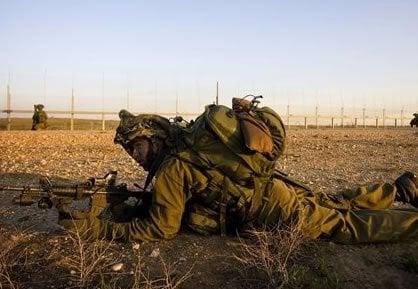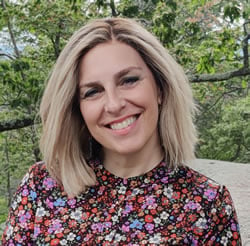
War. Guns. Bullets. Combat Officers. Tanks. Paratroopers. Unfortunately, we've all become far too familiar with these terms.
And yet, as familiar as I am, for me, as for many of us in the Western world, the whole scenario remains a vague blur.
And as small a nation the Jewish people is – and though I may know people who currently are, were or will be serving in the Israeli army – it's still all about them.
Fighting far away, over there. Across a vast ocean.
As connected as I may feel to our Homeland, as much as I feel so much a part of one large extended Jewish family, it remains in safe cognitive dissonance territory.
As an editor at this site, over the last few days, me and my colleagues have been working round the clock to gather personal reflections, thoughts, life scenes and interviews with the people on the scene, personally affected by the current war—precisely to make it more personal. I was especially excited when we found a soldier on the frontlines who began texting us his regular blog and provided me, and all of us, with a real live human soldier, among the sea of soldiers, who could communicate the personal thoughts and emotions that were coursing through his veins.
And yet, still, for me at least, there was still an element of far away, over there-ness. The war hadn't yet been brought home.
Until today.
This past week, an email was sent out to our entire community by my father, Rabbi Dovid Schochet, our community rabbi, making us aware of two of "our own" boys who were stationed on the front, asking us to increase in prayers and good deeds in their and all the soldiers' merit.
"Our" two boys, Avraham Meyer (ben Leah Naomi) Ostfeld and Levy Yitzchack (ben Margalit) Mogilevsky, are in their early twenties. They grew up in our Toronto community, where their families currently live, just a stone's throw from my own home. Yet the boys decided, on their own, to volunteer for the Israeli army; and in their respective special divisions – they were chosen from amongst many others in training – both are preparing to be at the very fore of the ground assault—if and when it may come.
I reached one mother, Lily Ostfeld, last night. Lily and her husband, Eron, are well-known members of the Toronto Chabad community, as well as the international Chabad community, for their philanthropy. Here, Lily is known for her modest grace, elegance and open warmth, generously offering her beautiful, spacious home to host any one of our many large communal events.

"What is it like for you to have a son poised to begin the ground assault? To come face to face with his enemies?" I ask Lily.
"Avrohom Meyer was actually serving in an intense Mazlan battalion in the North. He switched very recently to the elite Golani brigade where he felt that the atmosphere was less intense, less rivalry and there was more of a sense of camaraderie amongst the unit. At this point," here Lily sighs, "I guess I've got mixed feelings about his switch, since he might very well be involved in ground combat."
"How did it all begin?" I wonder.
Lily speaks openly and frankly. "Three years ago, Avrohom Meyer was studying in CRC, now Meorot Chabad, a Lubavitch yeshivah in Israel, when he decided to volunteer for the army. He is well aware of the faults of the Israeli government in the whole peace plan and fully understands why many people are disillusioned with the effectiveness of the government in providing adequate security for its citizens," Lily pauses. "But he has always said to me, 'Our brothers and sisters are in danger. Someone has to go to the front line to protect them. Just because the government puts the land in peril, someone still has to defend them.'"
One of those "someones" is now Avrohom Meyer.
How does a mother, living a comfortable life in Toronto, feel about her son's decision?
"I'll be honest with you, Chana." Lily confides. "I can't tell you how many times I tried to talk him out of this. I can't say that I've supported his decision. I still have reservations and I admit that I was not a fan. And yet, I admire his determination and I'm so impressed by his motives.
"And the way that I hear him talking now—he's changed. He's grown. Life in the army makes them grow up really quickly. They gain a certain…" Lily grasps for the word, "a certain wisdom and knowledge.
"Look, here is a Toronto boy, growing up in a sheltered, cushy environment. And suddenly, he's faced with real questions, with life staring him in the face, and situations that he needs to ask for guidance, from mentors.
"We speak to him very often—probably three or four times a day! I call him every night at 1:30AM, which is 8:30 in the morning Israel time, to hear what is happening, or if he has been informed of the day's schedule.
"It's important for him to speak to us. He can talk to us differently than to his katzin (army officer)—even though he's got a great officer who's a former expellee from Gush Katif and from whom he's learned so much—but there are still things that you want to say to your mother or your father.
"He's talking differently. He speaks about preparing his mindset, being especially focused in his goals and his mission and how he needs to be ready—not only physically but emotionally too—to face the enemy. He's done his briefing and his training and a lot of work on himself emotionally to be in the right frame of mind."
"And, you, as a mother, Lily?" I ask. "How are you faring? What do you do when you feel nervous or scared?"
Without a pause, Lily continues, "I remind myself of this:
"I know he is there with his chitas [book containing a Chumash, Psalms, and Tanya, recommended by the Rebbe for extra safety—C.W.] safely nestled in his bullet-proof vest, and with his Rebbe dollars.
"I know the Abishter firt de velt—G‑d runs the world.
"And…I say my Tehillim (Psalms)."
Almost as an afterthought, Lily says, "Please, Chana, write that the more Tehillim that is said for our boys, the more mitzvot that are done—it's so important for them…and the more encouragement we all feel."
Because really truly, there is no them.
It is all about us. Every one of us.







